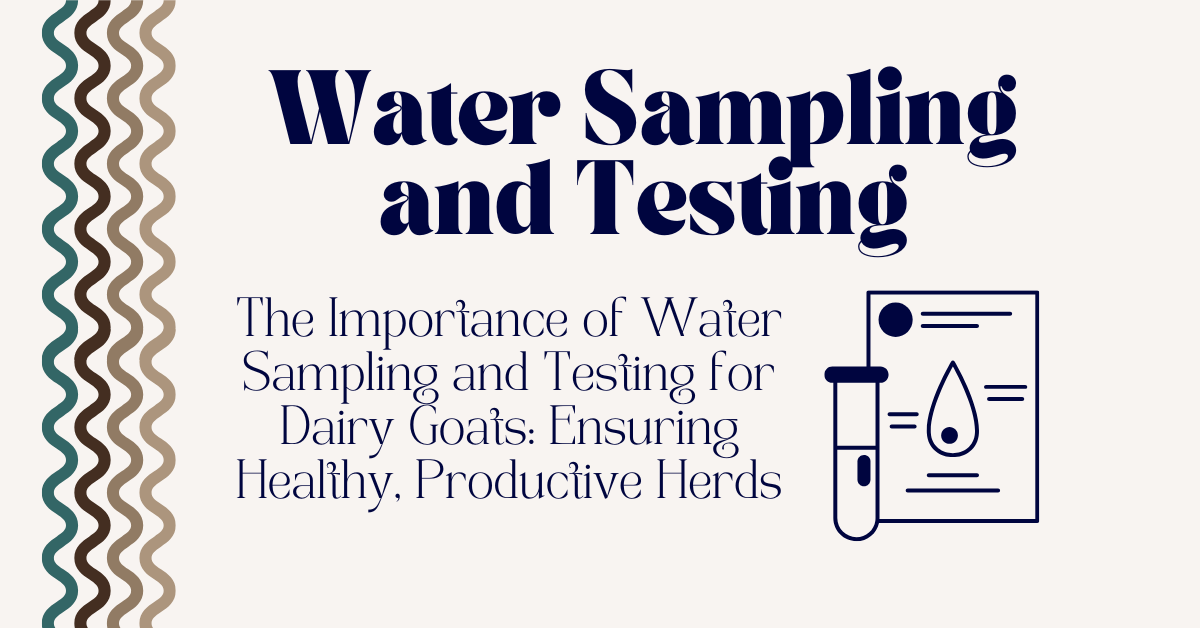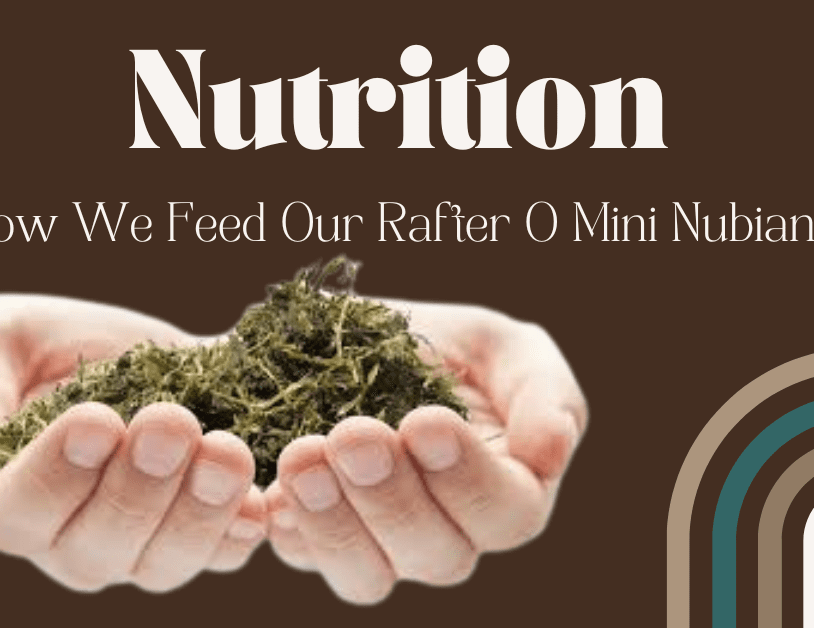The Importance of Water Sampling and Testing for Dairy Goats: Ensuring Healthy, Productive Herds
When it comes to keeping dairy goats healthy, water is just as crucial as quality feed and proper care. We often hear about the importance of nutrition and health care, but one element that’s sometimes overlooked is the quality of water your goats drink. Water quality plays a significant role in maintaining good health, optimal milk production, and overall well-being. In this blog post, we’ll dive into why water sampling and testing are essential for dairy goat herds and how regular water checks can help ensure your goats thrive.
Why Water Quality Matters for Dairy Goats
Water is the most important nutrient for your goats. In fact, goats can drink up to 5-10 gallons of water per day depending on their size, activity level, and milk production. Just like humans, goats need clean, fresh water to stay hydrated, digest food, regulate their body temperature, and produce milk. Poor water quality can directly affect their health and productivity.
Contaminated or poor-quality water can lead to a variety of health issues, ranging from digestive problems to severe diseases. Additionally, waterborne pathogens can affect milk quality, which is critical for dairy production. If goats are drinking water that contains high levels of bacteria, parasites, or harmful chemicals, their immune systems can become compromised, making them more susceptible to illness and reducing milk yields.
Common Water Contaminants That Can Affect Goats
Several types of contaminants can be present in water that may be harmful to dairy goats. Testing the water regularly helps identify these issues before they become a serious problem. Here are some common contaminants to be aware of:
- Bacteria: Pathogenic bacteria such as Escherichia coli (E. coli) or Salmonella can be present in water and lead to severe infections in your goats, including diarrhea, dehydration, and even death. These bacteria can also impact the quality of milk produced, potentially making it unsafe for human consumption.
- Nitrates and Nitrites: High levels of nitrates, which can leach into water from fertilizers or animal waste, can cause toxicity in goats. Nitrate poisoning can lead to symptoms such as lethargy, difficulty breathing, and even death. Nitrates interfere with the blood’s ability to carry oxygen, which can be a serious threat to your herd’s health.
- Heavy Metals: Contaminants like lead, arsenic, and copper can also be found in water sources, especially if the water is coming from an industrial or agricultural area. These metals are toxic to goats, leading to a variety of health problems, including kidney damage, neurological issues, and reproductive problems.
- Parasites: Water sources, especially stagnant ones, can be breeding grounds for parasites like Cryptosporidium and Giardia, which cause severe gastrointestinal distress in goats. These parasites can compromise the goats’ ability to absorb nutrients and maintain a healthy digestive system.
- Algae and Fungi: Algae blooms or fungal growth in water can lead to harmful toxins that can make goats ill. These toxins can cause symptoms like vomiting, diarrhea, and even liver damage.
Why Testing Is Crucial
Water testing is the best way to detect contaminants before they affect your herd. Just like we regularly test soil, feed, and milk for nutrients and pathogens, water should also be tested to ensure it meets the necessary standards for goat health. Here’s why regular water sampling and testing are so important:
- Identify Potential Contaminants: Regular testing helps identify harmful bacteria, parasites, and chemicals that may not be visible to the naked eye. Water can look clear but still contain harmful contaminants. Testing provides peace of mind that your water source is safe and clean.
- Optimize Milk Production: Goats rely on water for digestion and milk production. Poor water quality can reduce milk yield, and if goats are dehydrated due to poor water intake, they may also be more susceptible to illness. Ensuring that your goats always have access to clean, fresh water helps maintain milk production and promotes overall health.
- Prevent Health Problems: Many waterborne issues, such as bacterial infections or poisoning, can be avoided through early detection. By identifying water quality issues early on, you can take appropriate actions to prevent major health issues in your goats, saving you time and money on veterinary bills.
- Ensure Safe Milk for Consumers: If your dairy goats’ water contains harmful bacteria or chemicals, it can affect the quality of the milk they produce. Regular water testing ensures that the milk is safe for human consumption, helping you avoid potential violations of health and safety regulations.
- Improve Goat Growth and Reproduction: Clean water is essential for proper digestion and nutrient absorption. Without adequate hydration, goats may experience slower growth, reduced reproductive performance, and overall health problems. Testing the water helps ensure that your goats are getting the hydration they need to thrive.
How to Test Water Quality
Testing water quality for your goats is easier than you might think. Here’s a simple guide on how to go about it:
- Collect a Sample: Take a clean sample of water from your main water source. Use a sterilized container to avoid contamination. Make sure to collect water from areas where goats typically drink.
- Choose the Right Test: There are several types of water tests available, including general tests for bacteria, nitrates, heavy metals, and parasites. You can choose a complete test kit that covers a variety of potential contaminants, or you can opt for a specialized test if you know there’s a specific concern.
- Send It to a Lab: Many local agricultural extension offices or veterinary clinics offer water testing services. Alternatively, you can send your water sample to a specialized laboratory that tests for livestock water quality. They will provide you with results and recommendations.
- Interpret Results: Once you receive your water test results, you can work with your veterinarian or an agricultural expert to interpret them. If any issues are found, they can advise you on corrective measures such as filtration, water treatment, or improving your water source.
Conclusion
Water quality is one of the most overlooked aspects of goat care, but it’s crucial to maintaining a healthy, productive herd. By testing your water regularly, you can ensure that your dairy goats are receiving clean, safe water that promotes optimal health, milk production, and growth. Whether you are a small hobby farmer or managing a large commercial herd, regular water testing is a simple yet vital practice that can prevent many common health issues and improve the overall well-being of your goats.
Stay proactive and make water quality a priority for the health and success of your dairy goat operation!




